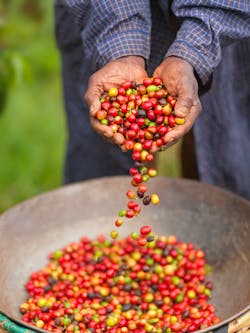Earlier this fall, McDonald’s announced that it plans to purchase all of its coffee from sustainable sources by 2020. It’s a growing movement in the coffee industry as consumers become increasingly concerned about the origins of their foods and beverages, and the quick service giant isn’t the first U.S. company to make a pledge towards a sustainably sourced cup o’ joe.
But consumers aren’t just looking to large corporations for sustainably sourced coffee. They are looking locally in their grocery store aisles, their coffee houses and indeed their workplace hot beverage offerings, too.
Sustainability in OCS
So what is sustainably sourced coffee? Though there is not one set definition, Conservation International, an American nonprofit environmental organization, describes sustainable coffee as “coffee that is grown in a way that conserves nature and provides better livelihoods for the people who grow and process it.” Sustainably sourced coffee is grown to social, environmental and economic standards, with third-party certification such as Rainforest Alliance Certified™, Fair Trade USA, UTZ Certified, and others.
For nearly 8 years Jim Carbone, COO of Chicago, IL-based Truebrew Coffee & Tea Outfitters, has been asked about sustainable coffee options in his OCS offerings. “It has definitely been a concern of many people and businesses that the coffee farmers are being treated fairly,” said Carbone. “We have many office customers as well as hospitality customers that will pay extra for fair trade coffee.”
Sustainably sourced coffee can be more expensive, says Carbone, because it’s an investment in the coffee-growing process and the people who create the product. “It’s the same coffee, but its fair trade, meaning the employees working during harvest get paid a living wage. Customers spend more money, and the quality of the beans is better in some cases, but the roasting process is still the same,” he said.
Client perception
For the most part, Carbone says sustainable coffee requests are client driven. This is unsurprising, as the 2016 National Coffee Drinking Trends report put out by the National Coffee Association revealed that sourcing from “farms that treat workers well” is one claim that motivates consumers to buy a brand of coffee. And having the ability to say “yes” when a customer asks about sustainable offerings is what sets Truebrew apart, says Carbone. “It’s part of our offerings and it differentiates us,” he said.
Carbone admits that not everyone asking for fair trade coffee knows exactly what he or she is asking for. “Although some people are educated in what it means, others ask for it because it’s trending…it’s a buzzword.”
Across the country, Tom Steuber, president of San Leandro, CA-based Associated Services notes that when it comes to sustainably sourced coffee, location type is important. “We have quite a few customers who are more focused on price, so they don’t get into sustainability,” said Steuber. “But we also have a small number of locations like environmental law firms and churches that are definitely interested in sustainability.”
In Steuber’s market, sustainability doesn’t take the form of coffee origin, but in its environmental impact. Many will not purchase single-cup items if they are considered ‘environmentally unfriendly.’ In fact, in Steuber’s market, sustainable ancillary products are a growing trend. Steuber has seen increased interest in paper products in the last few years. “Long ago, we sold a lot of Styrofoam cups, but now it’s all paper and we’re selling a lot of compostable cups also,” he said. “The same with plates and napkins. People want sustainable options in the ancillary items.”
Though there are various aspects of what makes coffee sustainably sourced, there’s no doubt that consumers will be asking about sustainable options if they haven’t already — OCS operators should be prepared to meet those requests.
About the Author

Adrienne Klein
Contributing Editor
Adrienne Zimmer Klein is a freelance writer with a background in the vending, micro market and office coffee service industry. She worked as an associate editor and managing editor at Automatic Merchandiser and VendingMarketWatch.com from 2013 until 2017. She is a regular contributing writer at Automatic Merchandiser.
